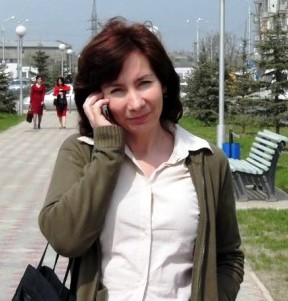About Tanya Lokshina
Tanya Lokshina is a senior researcher for Europe and Central Asia at Human Rights Watch.
Articles by Tanya Lokshina
This week's editor
Adam Ramsay is Editor of oD-UK.
No to TTIP
Constitutional conventions: best practice
Natalia Estemirova, champion of ordinary Chechens

Natalia Estemirova was Chechnya's great champion of human rights until her kidnap and murder last month. On the 40th day after her death, her friend Tanya Lokshina of Human Rights Watch commemorates a uniquely courageous and selfless woman.
Chechnya: the torchings
‘Wahhabi’ village in Dagestan
Dagestan: curse of the sixth department
Ending Chechnya’s counterterrorism operation - or not
Georgia war: auditing the damage
The armed conflict in Georgia may have lasted only one week in August 2008, but the resulting chaos will take much longer to sort out. Tanya Lokshina draws on Human Rights Watch's recent report to audit the damage and suggest a way forward.
South Ossetia: aftermath of war
Tanya Lokshina of Human Rights Watch revisits Tskhinvali following the August attack by Georgian troops to find the locals re-building, and Russian troops digging in
Putin, Chechnya, and Politkovskaya
"In our country too many people, forces and agencies would like to get rid of an uncompromising, relentless journalist.” Tanya Lokshina assesses the politics of Anna Politkovskaya’s murder.
(This article was first pubished on 12 October 2006)
A month after the war
South Ossetia: Tskhinvali’s Apocalypse
With the fighting over, this researcher for Human Rights Watch hitches lifts between checkpoints around South Ossetia's wrecked capital Tskhinvali chronicling the grieving and burying, looting and burning, the unexploded bombs, disenchanted militias and Russian troops struggling to protect what remains of abandoned Georgian villages.
War comes to Ingushetia
The border of Chechnya and Ingushetia used to mark the line between war and peace. Now the shootings, torture and disappearances have begun.
Russian civil society: an appeal to Europe
- 1 of 2
- ››






 Fighting and torture continue to rack eastern Ukraine.
Fighting and torture continue to rack eastern Ukraine. 

 Central and western Ukraine may have elected a president, but the southeast of the country is a war zone, in all but name.
Central and western Ukraine may have elected a president, but the southeast of the country is a war zone, in all but name.
 ‘NGO’ has become a dirty word in Russia. The organisations most
committed to helping Russia develop a meaningful civil society have become
pariahs, branded as ‘foreign agents.’ Under the tightened screws, we are asking
the question: ‘Do NGOs in Russia have any future?’
‘NGO’ has become a dirty word in Russia. The organisations most
committed to helping Russia develop a meaningful civil society have become
pariahs, branded as ‘foreign agents.’ Under the tightened screws, we are asking
the question: ‘Do NGOs in Russia have any future?’ Anna Sevortian and Tanya Lokshina of Human Rights Watch present a new week-long series on openDemocracy Russia
Anna Sevortian and Tanya Lokshina of Human Rights Watch present a new week-long series on openDemocracy Russia
 Russia holds parliamentary elections on Sunday, but with most of the important questions already well answered, there is little in the way of pre-election suspense. Tanya Lokshina writes on crows, apathy and a growing number for whom Putin’s soft authoritarianism is already yesterday’s story.
Russia holds parliamentary elections on Sunday, but with most of the important questions already well answered, there is little in the way of pre-election suspense. Tanya Lokshina writes on crows, apathy and a growing number for whom Putin’s soft authoritarianism is already yesterday’s story.  Russia’s 9 time zones are often exploited by TV management to pull controversial programmes, but the internet has changed the rules of the game. A recent film about kidnap victims in Chechnya was shown in the Far East, but not in European Russia. The ensuing outcry and internet activity show that people have had enough of censorship, says Tanya Lokshina
Russia’s 9 time zones are often exploited by TV management to pull controversial programmes, but the internet has changed the rules of the game. A recent film about kidnap victims in Chechnya was shown in the Far East, but not in European Russia. The ensuing outcry and internet activity show that people have had enough of censorship, says Tanya Lokshina The southern republic of Dagestan is now Russia’s most violent flashpoint. Besieged by militants from one side, the republic is no better served by its security services on the other. Indeed, the brutality and lawlessness of these government forces actually risks motivating yet more young men to ‘go to the forest’ and join the fighters.
The southern republic of Dagestan is now Russia’s most violent flashpoint. Besieged by militants from one side, the republic is no better served by its security services on the other. Indeed, the brutality and lawlessness of these government forces actually risks motivating yet more young men to ‘go to the forest’ and join the fighters.









